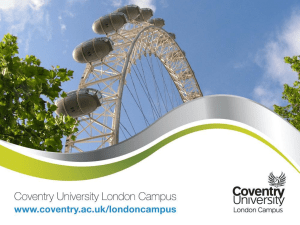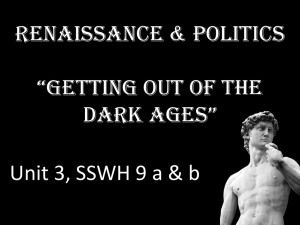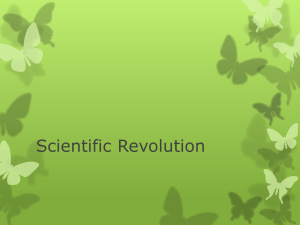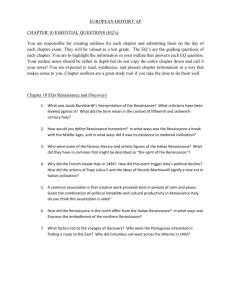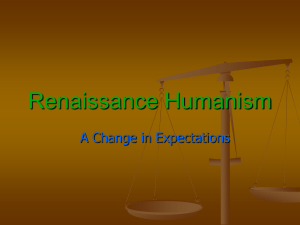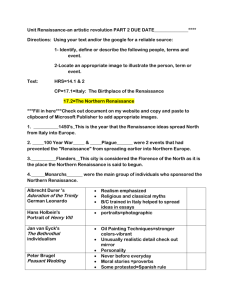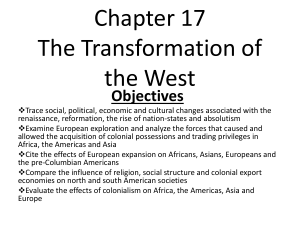Transformation of the West 1420
advertisement
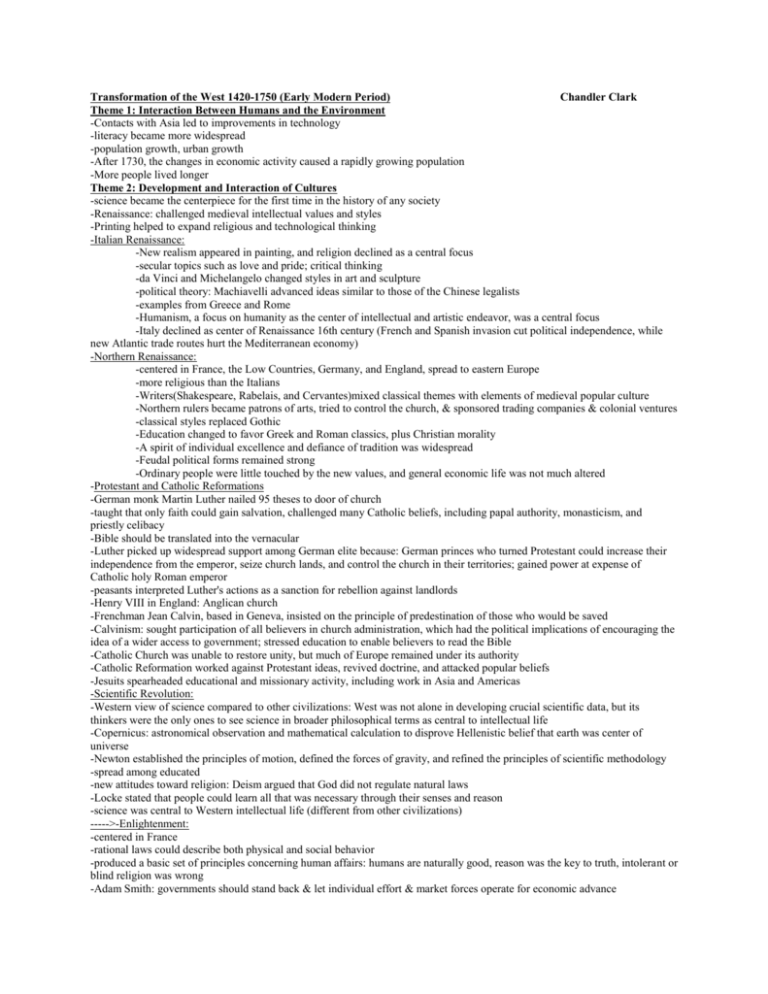
Transformation of the West 1420-1750 (Early Modern Period) Chandler Clark Theme 1: Interaction Between Humans and the Environment -Contacts with Asia led to improvements in technology -literacy became more widespread -population growth, urban growth -After 1730, the changes in economic activity caused a rapidly growing population -More people lived longer Theme 2: Development and Interaction of Cultures -science became the centerpiece for the first time in the history of any society -Renaissance: challenged medieval intellectual values and styles -Printing helped to expand religious and technological thinking -Italian Renaissance: -New realism appeared in painting, and religion declined as a central focus -secular topics such as love and pride; critical thinking -da Vinci and Michelangelo changed styles in art and sculpture -political theory: Machiavelli advanced ideas similar to those of the Chinese legalists -examples from Greece and Rome -Humanism, a focus on humanity as the center of intellectual and artistic endeavor, was a central focus -Italy declined as center of Renaissance 16th century (French and Spanish invasion cut political independence, while new Atlantic trade routes hurt the Mediterranean economy) -Northern Renaissance: -centered in France, the Low Countries, Germany, and England, spread to eastern Europe -more religious than the Italians -Writers(Shakespeare, Rabelais, and Cervantes)mixed classical themes with elements of medieval popular culture -Northern rulers became patrons of arts, tried to control the church, & sponsored trading companies & colonial ventures -classical styles replaced Gothic -Education changed to favor Greek and Roman classics, plus Christian morality -A spirit of individual excellence and defiance of tradition was widespread -Feudal political forms remained strong -Ordinary people were little touched by the new values, and general economic life was not much altered -Protestant and Catholic Reformations -German monk Martin Luther nailed 95 theses to door of church -taught that only faith could gain salvation, challenged many Catholic beliefs, including papal authority, monasticism, and priestly celibacy -Bible should be translated into the vernacular -Luther picked up widespread support among German elite because: German princes who turned Protestant could increase their independence from the emperor, seize church lands, and control the church in their territories; gained power at expense of Catholic holy Roman emperor -peasants interpreted Luther's actions as a sanction for rebellion against landlords -Henry VIII in England: Anglican church -Frenchman Jean Calvin, based in Geneva, insisted on the principle of predestination of those who would be saved -Calvinism: sought participation of all believers in church administration, which had the political implications of encouraging the idea of a wider access to government; stressed education to enable believers to read the Bible -Catholic Church was unable to restore unity, but much of Europe remained under its authority -Catholic Reformation worked against Protestant ideas, revived doctrine, and attacked popular beliefs -Jesuits spearheaded educational and missionary activity, including work in Asia and Americas -Scientific Revolution: -Western view of science compared to other civilizations: West was not alone in developing crucial scientific data, but its thinkers were the only ones to see science in broader philosophical terms as central to intellectual life -Copernicus: astronomical observation and mathematical calculation to disprove Hellenistic belief that earth was center of universe -Newton established the principles of motion, defined the forces of gravity, and refined the principles of scientific methodology -spread among educated -new attitudes toward religion: Deism argued that God did not regulate natural laws -Locke stated that people could learn all that was necessary through their senses and reason -science was central to Western intellectual life (different from other civilizations) ----->-Enlightenment: -centered in France -rational laws could describe both physical and social behavior -produced a basic set of principles concerning human affairs: humans are naturally good, reason was the key to truth, intolerant or blind religion was wrong -Adam Smith: governments should stand back & let individual effort & market forces operate for economic advance -Methodism demonstrated the continuing power of spiritual faith Theme 3: State Building, Expansion and Conflict -overseas expansion and growing commercial dominance---> change in West -Governments increased their powers -Renaissance sketched brasher spirit ---> create new Western interest in exploring -Louis XIV of France: absolute monarchy -Protestant and Catholic Reformations led to religious wars 16th and 17th centuries -In France, Calvinists and Catholics disputed until the edict of Nantes in 1598 gave Protestants tolerance. -The Thirty Years’ War (1618-1648) pitted German and Swedish Protestants against the holy Roman emperor and Spain, established principle of territorial toleration; reduced German prosperity and power for a full century; some princely states in Germany chose one religion, some another; treaty that ended the war granted political independence to Protestant Netherlands -religion was an important issue in English civil strife; most Protestants, but not Catholics, gained toleration -religious wars led to very limited concepts of religious pluralism -France gained power, the Netherlands and England developed international trade, and Spain lost dominance -Protestant theory encouraged parliamentary power -feudal balance between monarchs and nobles came undone in 17th century -Monarchs gained new powers in warfare and tax collection -France became the West's most important nation -centralized authority, professional bureaucracy and military -absolute monarchy; Louis XIV -Louis XIV followed economic theory of mercantilism, supported measures improving internal and international trade, manufacturing, and colonial development -Similar policies occurred in Spain, Prussia, and Austria-Hungary -absolute monarchs pushed territorial expansion -Britain and the Netherlands formed parliamentary regimes -English political settlement occurred in 1688 and 1689; parliament won basic sovereignty over the king -power came from the people, not from a royal divine right, and that they had the right to revolt against unjust rule -many competing nation-states kept the West politically divided and at war -Political changes were the least significant -England and France continued with their previous patterns -Frederick the Great of Prussia introduced greater religious freedom, expanded state economic functions, encouraged agricultural methods, promoted greater commercial coordination and greater equity, and cut back harsh traditional punishments Theme 4: Creation, Expansion and Interaction of Economic Systems -15th century: Europe moved to a new role in world trade -While remaining an agricultural society, West became unusually commercially active & developed strong manufacturing sector -Renaissance was built on more commercialized economy -Greater commercialization was spurred by substantial price inflation during 16th century -New World gold and silver forced prices up, and product demand surpassed availability -trading companies formed to take advantage of colonial markets -increasing commerce stimulated manufacturing---> Specialized agricultural regions -Italian Renaissance: Merchants and bankers moved into profit-seeking capitalist ways -mass consumerism -Paid, professional entertainment as part of popular leisure -new agricultural methods -New World crops, like the potato, increased the food supply --->-manufacturing: 18th century witnessed rapid spread of household production of textiles and metal products, mostly by rural workers who alternated manufacturing with some agriculture -technological innovations (flying shuttle in weaving) improved efficiency Theme 5: Development and Transformation of Social Structures -Enlightenment treatment of children: parents became more interested in freer movement & greater interaction for young children -inflation and commercialization in West produced group of people without access to producing property called the: proletariat -European-style family -late marriage age---> birth control, limited overcrowding -nuclear families of parents and children vs. extended families of most agricultural civilizations -husband-wife relations; linked family to individual property holdings -Women, however, if unmarried, had fewer alternatives when Protestants abolished convents -Commercialization created a new rural and urban proletariat that suffered from increased food prices -For the more prosperous, commercialization supported a more elaborate family life and demystification of nature -stimulated popular protest during the first half of the seventeenth century -Witchcraft hysteria reflected economic and religious uncertainties; women were the most common targets -The Renaissance created a new wedge between the elite and the masses; elite pulled away from a shared popular culture -Enlightenment: less harsh punishment for children, affection among family members


